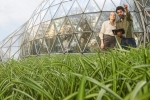
Full Name: Warrick Ranson
Current Role: Group Chief Financial Officer
Current Organisation: Sims Limited
Last Role at PwC: Manager, Coopers & Lybrand
Time at PwC: 1986 - 1992
What’s the one career achievement you’re most proud of and why?
I’ve been fortunate to be involved in a number of success stories throughout my career and all have been great learning opportunities. Most have been where I’ve been ‘thrown into the deep end’ and at least initially, I wasn’t sure if I was the right person for the job! I think that really supports the challenge we often give our people about stepping out of their comfort zone as a pathway to advancing their career.
One that really stands out for me was when I was asked to lead the development strategy for how we’d grow the Pilbara business for Rio Tinto iron ore. We were producing just above 45mtpa (million tonnes per annum) when I started the work and the original intention was to take it to 280mtpa iegrowing the business by over 6 times.
It was a $12 billion pipeline of construction – mines, rail, port – and how it all came together, but importantly it was also recognition that we needed to run the organisation differently. My blueprint led to the development of the first remote operations centre in Perth and a business that is now at ~330mtpa. It was huge!
What’s been your biggest career challenge and how have you overcome it?
I’ve actually been made redundant three times in my career! It’s often hard to comprehend being told your role is finishing and to realise that, in most cases, it’s actually not about you and coming to terms with that. More than often it’s a case of musical chairs and of course it’s more specifically about the needs of the business at the time. On one occasion my then young daughter put a sticky note on my bathroom mirror reminding me every day to keep looking forward, not back, and of course she was right! All three occasions have led to better, more progressive, career pathways and helped me get to where I am today.
What do you remember most fondly from your time at PwC’s legacy firm, Coopers & Lybrand?
The people! I actually started in a very small office of the firm before taking an overseas secondment into Singapore. Many of the people I worked with back then have become life-long friends who I still connect with today. I carry so many memories of hard work but combined with a lot of fun – both at and away from the work environment. Being a small office also meant that we got to be involved in a lot of the different aspects of public practice – it was a fantastic training ground.
You have extensive executive and non-executive experience within corporations operating across global markets. What advice would you give those seeking to cultivate and maintain key stakeholder relationships across cultures and geographically dispersed organisations?
Continually put yourself in the shoes of the other party. It’s really important to respect the culture of the country you’re in and adapt your thinking and style to what will work. It doesn’t mean you have to change your intended outcome – it’s just the way you get there. It can be reciprocated as well - I was once asked to negotiate a development agreement with a foreign government and the first thing I did was to park the negotiations and run a series of workshops with both parties tabling their desired outcomes and the reasons for them so we could generate mutual understanding. Taking the opportunity to educate and understand underlying motivations is an important step in any negotiation.
A Sims report states that by 2050, the ocean will have more plastic in it than fish (by weight). As a global leader in metal recycling and provision of circular solutions for technology, how is Sims investing in technology and innovation to mitigate this alarming projection?
I believe that was a quote from the Ellen Macarthur Foundation, which is a charity focussed on supporting the creation of circular economies. Whilst our focus is on metals and repurposing IT assets and electronic equipment, extending the lifecycle of any resource is critical to the future for all of us and really epitomises our company purpose of ‘Creating a world without waste to preserve our planet’. Anything that we can do to minimise waste and maximise recovery in that process is valuable to all parties.
Sims has been operating for more than 100 years and our focus on customer and supplier needs for clean product has provided the catalyst for our ongoing investment in large shredding capacity, innovative processes and products, as well as automation, to provide quality products, supply chain reliability and a differentiated value proposition - including the removal and responsible management of waste.
You mentor youth at the Operation Flinders Foundation. What does this involve and how is it meaningful to you?
I’m a field volunteer and get to lead a group of around ten 15-16 year olds on an eight day bush exercise in the Flinders Ranges in South Australia. My employer is very generous in allowing me time off to participate and I’d love to be able to do it more than once a year (but of course I have to manage that against other commitments). We aim to get around 500 young people through the main program each year and it’s principally run by volunteers.
Our bush exercises are designed to create opportunities for young people facing challenges through adventure therapy, providing demanding experiences, personal development and pathways to wellbeing and life success. There are no mobile phones and not much between us and the stars at night.
Importantly it provides them with a psychological circuit breaker intended to increase resilience to tackle the challenges of life and is especially designed for those from environments with family dysfunction, drug abuse, and physical abuse to improve their self-confidence and self-esteem, ability to work in teams, and ability to accept responsibility.
It’s just such a rewarding program and I often feel that the participants give me so much more in life learnings than I might be able to give them! We do measure our success, and a large number of our participants subsequently demonstrate significantly improved self-esteem, attitudes towards criminal behaviour, and classroom behaviour. When someone tells you you’ve changed their, or their son or daughter’s life, there’s not much more you could wish for.
What do you believe are the top three traits of a great leader?
It’s hard to narrow it down to just three. There’s definitely one around emotional intelligence! Self awareness, inclusive and diverse leadership, trust and empowerment all fit into this bucket of course. You also need to be able to drive a vision and purpose while at the same time having the situational adaptability to recognise that you might need to change your own direction from time to time. Integrity and empathy are also critical traits in my view.
You’ve lived abroad and across a number of states in Australia. Which isyour favourite and why?
I often get asked this question! To be honest I don’t have a favourite as such. I’ve lived in country towns to cities with millions of people in them and each has been a special opportunity, with its own set of life experiences.
All my moves have been work related and I continue to be amazed that I’ve had the opportunity to explore the world because of my career as a Chartered Accountant. Yes, that PY year (Professional Year - where grads sit exams and become CA qualified) was worth it! But regardless of where the role takes you, you need to adapt to the culture (and yes Perth has a different culture to Sydney even!) if you are to really enjoy the opportunity to live and work elsewhere.















